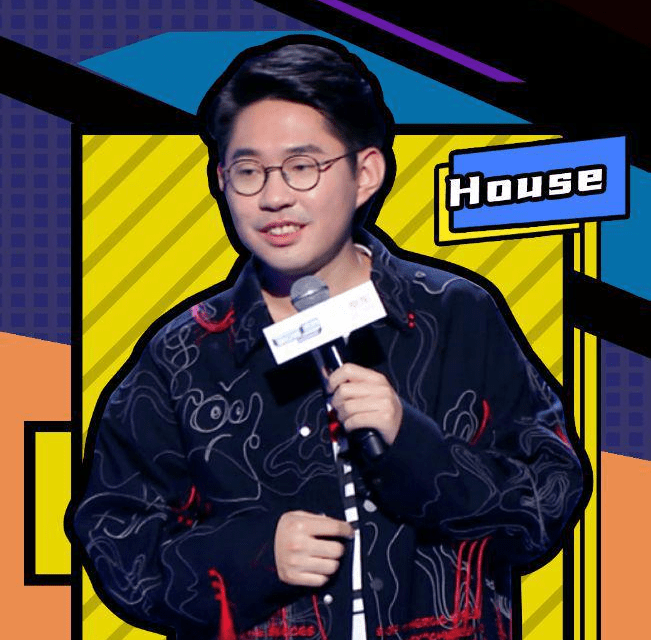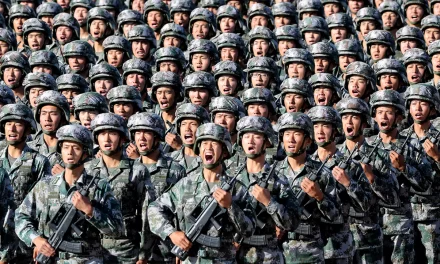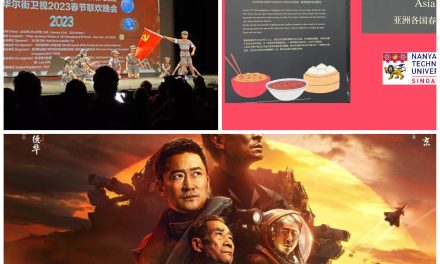On May 13, House, the stage name of the performer Li Haoshi and a member of the Shanghai Xiaoguo Cultural Media troupe, said in a joke that the two wild dogs he adopted reminded him of eight words: “Excellent manner, they can win battles.” But, unimaginably, in using these eight words he was accused of offending the People’s Liberation Army, and the troupe’s company was investigated and fined more than 13 million yuan. The company’s performances in Beijing and Shanghai were cancelled.
Xiaoguo Cultural Media Group is an entertainment and cultural company that has risen rapidly in mainland China in recent years. The key to its success is the jokes told by its performers onstage. The performers associated with them come from all over the world and from all walks of life — “sea turtles” [current Chinese slang for Chinese who studied overseas], grassroots migrant workers, teachers, employees, workers, etc. Their jokes, sometimes harsh and sometimes less so, have a common characteristic: they make fun of things in their own lives. They have two kinds of ridicule: they either sanctify their ordinary lives or they take the high-and-mighty down a peg and de-sacralize the things considered holy. Using these disparities, they create a comic effect and express the hidden truths in life. This is the reason for their popularity and the life force of all art: authenticity.
On this occasion, the eight characters that caused this catastrophe had first been spoken on March 11, 2013, when Xi Jinping, General Secretary of the Central Committee and Chairman of the Standing Committee of the Communist Party of China, spoke at the Twelfth National People’s Congress. At a plenary meeting of the PLA delegation he offered the following: “Building a people’s army that obeys the party’s command, can win battles, and has an excellent manner is the party’s goal, in order to strengthen the army under the new situation.”
House, by affixing Xi Jinping’s words about the People’s Liberation Army to the wild dogs he adopted, immediately dispelled the political sanctity of the PLA, and that of Xi Jinping and the PLA itself. At the same time, those eight characters contain history’s most powerful irony: the corruption of the Chinese army can be said to be the most extensive, while winning any battle now seems to be even more of a historical lie. Regardless of whether House did it intentionally (I believe it was unintentional), the objective effect of this joke does achieve the above two results. First it dispels the sanctity of the totalitarian government (including dispelling the rigid and stale language of Chinese officials). Second, it tells the truth. And these two effects are what a totalitarian government fears the most, because such jokes can dispel the people’s fear of it.
In fact, this is not only the practice of Chinese comic-stage performances. From the early comic cross talk [a traditional Chinese comic form featuring two people in dialogue], to sketches, to variety shows, and even across all the performing arts, many performance types include this same style. This is because the logic of art is exactly the opposite of the political logic of a totalitarian government. The logic of art is truth and irony; the logic of totalitarian government is lies and fear.
In April, 1975 Václav Havel described this fear in an open letter to Czechoslovakian President Husak:
“The fear we are dealing with is in a deeper sense, if you will, in an ethical sense, that of sharing more or less in a collective consciousness of an enduring, pervasive crisis, anxiety about what is or may be threatened, and gradually becoming accustomed to this threat through practical means. We follow various forms of external adaptation as the only effective means of self-preservation.”
Thus, Havel proposed that in a totalitarian society, the only right of the powerless is to speak the truth, and to live in the truth. This is the only way to eliminate fear and deal with a totalitarian government. This is also what a totalitarian government fears most.
Because of this, it is not difficult to understand why Xiaoguo Culture’s joke scares the CCP authorities so much. What scares them is not the joke per se, but the truth conveyed in it. In order to eliminate the spread of this kind of truth, the authorities must without mercy make examples of all who trespass, as in the Luo Changping (羅昌平) incident in 2021. In October 2021, when the Chinese-made film “Changjin Lake,” with its theme of resisting U.S. aggression and aiding North Korea [and referring to a battle known in English as the Battle of Chosin Reservoir], was released, many online comments that questioned its historical authenticity were deleted. Luo, a media personality, wrote on Weibo on October 6 of that year:
“Half a century later, Chinese people seldom reflect on the justice of this war, just like the Sand Sculpture Company [“Sand Sculpture” being a modification of “Ice Sculpture,” a Chinese term for one of the several Chinese military units participating in the battle, many of whose members froze to death during it] would not doubt the ‘wise decision’” of the commanding officers.”
From November to December 1950, during the battle of Changjin Lake, many Chinese soldiers froze to death in the severe cold weather in temperatures as low as minus 40 degrees Celsius. Luo Changping replaced “Ice Sculpture” with “Sand Scultpure,” which also shattered the sanctity of the army volunteers and called into question the authenticity of historical narratives. Just like the jokes by Xiaoguo Culture, this is what a totalitarian government fears the most. Therefore, Luo Changping was prosecuted by the Sanya Procuratorate of Hainan Province shortly thereafter, and was sentenced to 7 months in prison.
Not long before the Xiaoguo Culture incident, on May 11, Hong Kong’s “Ming Pao” newspaper announced the end of political cartoonist Zunzi’s 40-year-old political cartoon feature in the newspaper. This feature had been repeatedly accused by Hong Kong officials of “smearing the government” over the prior six months.
Earlier in the year, in March, Fu Cha (real name Li Yanhe), editor-in-chief of Taiwan’s Eight Banners Culture Publishing House, went to mainland China to visit relatives. His relatives and friends believe that his arrest there has something to do with his publication of many books in Taiwan that are banned in China.
Faced with such control and fear, what should the powerless do? Havel points out that we always have an implied hope in our minds, and we should not let ourselves lose the ability to think, to laugh.
In 1976, Czech authorities arrested members of the “Plastic People of the Universe” rock band. In one of their songs, “One Hundred Percent,” these rock singers sang:
They fear the old because of their memory
They fear the young because of their innocence
They even fear schoolchildren
They fear the dead and their funerals
They fear the graves and flowers which people put on those graves
They fear the church, priests and nuns
They fear the workers
They fear the Party members
They fear the non–Party members
They fear science
They fear art
They fear poems and books
They fear theatre plays and movies
…
They fear today’s evening
They fear tomorrow’s morning
They fear today and every day
They fear the future
They fear the past
…
They fear both joy and sadness
They fear jokes
They fear fairness
They fear honesty
They fear the educated
They fear the talented
…
SO WHY DO WE FEAR THEM?
Today, we can also ask: they fear a stand-up joke, they fear a newspaper cartoon, they fear a publisher’s book…So why should we fear them?
This piece was translated from Yibao Chinese. If republished, please be sure to add the source and link, https://www.yibao.net/2023/05/27/shi-potian-why-the-punishment-of-xiaoguo-cultural-media-was-so-harsh/ , before the text when reposting.
The views of the author do not necessarily represent those of this journal.
























